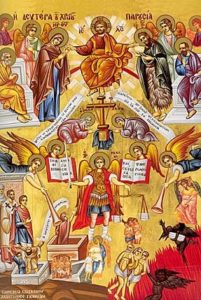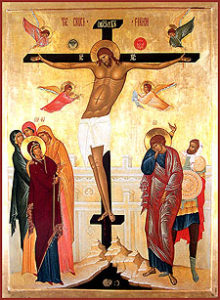Sunday of the Dread Judgement (Meatfare Sunday)
10/ 23February
 Resurrection Tropar, Tone 3: Let the heavens rejoice / let the earth be glad / for the Lord has shown strength with His arm! / He has trampled down death by death! / He has become the first-born of the dead! He has delivered us from the depths of hell / and has granted the world great mercy.
Resurrection Tropar, Tone 3: Let the heavens rejoice / let the earth be glad / for the Lord has shown strength with His arm! / He has trampled down death by death! / He has become the first-born of the dead! He has delivered us from the depths of hell / and has granted the world great mercy.
Resurrection Kondak, Tone 3: On this day thou didst rise from the tomb, O Merciful One, / leading us from the gates of death / On this day Adam exults as Eve rejoices. / With the prophets and the patriarchs they unceasingly praise the divine majesty of Thy power.
Kondak to Meat-fare Sunday, Tone 1: When Thou, O God, shalt come to earth with glory, and all things tremble, and the river of fire floweth before the Judgement Seat and the books are opened, and the hidden things made public, then deliver me from the unquenchable fire and deem me worthy to stand at Thy right hand.
Gospel: St. Matthew 25: 31-46
The Lord said: 31 When the Son of Man shall come in his glory, and all the holy angels with him, then shall he sit on the throne of his glory. 32 And before him shall be gathered all nations: and he shall separate them one from another, as a shepherd divideth his sheep from the goats: 33 And he shall set the sheep on his right hand, but the goats on the left. 34 Then shall the King say unto them on his right hand, Come, ye blessed of my Father, inherit the kingdom prepared for you from the foundation of the world: 35 for I was ahungered and ye gave me meat: I was thirsty, and ye gave me drink: I was a stranger, and ye took me in; 36 Naked, and ye clothed me: I was sick, and ye visited me: I was in prison, and ye came unto me. 37 Then shall the righteous answer him, saying, Lord, when saw we thee ahungered, and fed thee? or thirsty, and gave thee drink? 38 When saw we thee a stranger, and took thee in? or naked, and clothed thee? 39 Or when saw we thee sick, or in prison, and came unto thee? 40 And the King shall answer and say unto them, Verily, I say unto you, Inasmuch as ye have done it unto one of the least of these my brethren, ye have done it unto me. 41 Then shall he say also unto them on the left hand, Depart from me, ye cursed, into the everlasting fire, prepared for the devil and his angels: 42 for I was ahungered, and ye gave me no meat: I was thirsty, and ye gave me no drink: 43 I was a stranger, and ye took me not in: naked, and ye clothed me not: sick, and in prison, and ye visited me not. 44 Then shall they also answer him, saying, Lord, when saw we thee ahungered, or athirst, or a stranger, or naked, or sick, or in prison, and did not minister unto thee? 45 Then shall he answer them, saying, Verily, I say unto you, Inasmuch as ye did it not to one of the least of these, ye did it not to me. 46 And these shall go away into everlasting punishment: but the righteous into life eternal.
I WAS HUNGRY AND YOU GAVE ME FOOD
And in return for what do they receive such things? For the covering of a roof, for a garment, for bread, for cold water, for visiting, for going to prison. For indeed in every case it is what is needed, and sometimes not even that. For surely, the sick and one who is in bonds do not seek only for this, but the one to be freed, the other to be delivered from his infirmity. But He, being gracious, requires only what is within our power …leaving to us to exert our generosity in doing more…For even if they had done ten thousand things, the munificence would be of grace, since in return for services so small and cheap, such a heaven, and a kingdom and such great honour should be given them.
St. John Chrysostom. Homily LXXIX on Matthew XXV
 On Great and Holy Friday, Christ died on the Cross. He gave up His spirit with the words: “It is finished” (John 19:30). These words are better understood when rendered: “It is consummated.” He had accomplished the work for which His heavenly Father had sent Him into the world. He became a man in the fullest sense of the word. He accepted the baptism of repentance from John in the Jordan River. He assumed the whole human condition, experiencing all its alienation, agony, and suffering, concluding with the lowly death on the Cross. He perfectly fulfilled the prophecy of Isaiah:
On Great and Holy Friday, Christ died on the Cross. He gave up His spirit with the words: “It is finished” (John 19:30). These words are better understood when rendered: “It is consummated.” He had accomplished the work for which His heavenly Father had sent Him into the world. He became a man in the fullest sense of the word. He accepted the baptism of repentance from John in the Jordan River. He assumed the whole human condition, experiencing all its alienation, agony, and suffering, concluding with the lowly death on the Cross. He perfectly fulfilled the prophecy of Isaiah:











